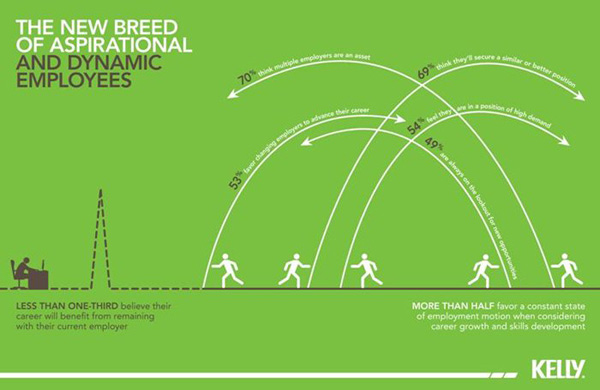- Home
- News
- Features
- Topics
- Labor
- Management
- Opinions/Blogs
- Tools & Resources
Survey: 53% Of Workers Worldwide Say Changing Jobs Is Key To Career Growth
There’s a lot restless workers worldwide.
More than half (53%) of the respondents of the Kelly Global Workforce Index (KGWI) survey believe that to develop their skills and advance their careers, it is more important to change employers, rather than remain with their existing employer, according to international staffing firm Kelly Services.
The KGWI examines issues of job mobility and career progression as part of a shift to what it calls a more autonomous and empowered workforce.
Nearly 170,000 people across all generations in 30 countries, including the Americas, Asia-Pacific and Europe, The Middle East And Africa, regions, participated in the current survey.
In spite of the lingering uncertainty in the economy, more than two-thirds (69%) of respondents say that if they did change jobs, they would be in a good position to negotiate a similar or better position.
“We are seeing a shifting attitude on the part of employees who are increasingly embracing the idea of working for multiple employers as a way to gain a wider array of work experience while they grow their careers,” said Steve Armstrong, senior vice president and general manager, Kelly Services.
Workers Most Confident In Asia-Pacific
The highest level of confidence is in Asia-Pacific (72%) and the Americas (71%), compared with Europe, The Middle East And Africa, (65%).
The survey reflects a changing attitude from workers, with more seeking to gain new experiences and skills with multiple employers.
As a sign of what Kelly says is a new sense of self-reliance and autonomy seen in today’s workforce, nearly half of all workers (49%) say that even when they are happy in a job, they actively look for better job opportunities or evaluate the job market.
“Employers face the reality that even happy workers are actively planning for the next step in their career and that many workers are seeing the advantages of wider employment experiences with a more diverse range of organizations,” Armstrong said. “Employers need to consider ways to improve their development and promotional programs so that employees think twice before switching employers.”
The survey also shows:
- Almost three-quarters (70%) consider work experience with multiple employers to be an asset to their career growth and advancement.
- The idea of a ‘career-for-life’ with one employer is regarded as “relevant” by one-third of respondents (31%).
- This notion of a “one-employer career” is stronger in the Americas (49%) than in Asia-Pacific (29%) and Europe, The Middle East And Africa, (21%).
- Employees with professional and technical skills are less attracted to the idea of a career-for-life with one employer (28%) than other workers (35%).
In the United States, almost two-thirds (63%), say that if they did change jobs, they would be in a good position to negotiate a similar or better position.
The survey shows that the idea of a career-for-life with one employer is regarded as relevant by 44% of workers.
However, those with professional and technical skills are less attracted to the career-for-life (39%) proposition compared to other workers (49%).
The survey’s results in the United States show:
- Well over half (60%) say experience with multiple employers is an asset in their career development.
- More than a third (36%) admit that they actively look for new jobs, even when happy in their current ones.
- Only 22% believe they will have the chance to progress or gain a promotion with their currentemployer in the next year.
- Half of those surveyed believe that their current employer is not realizing their full potential.
List your business in the premium web directory for free This website is listed under Human Resources Directory






